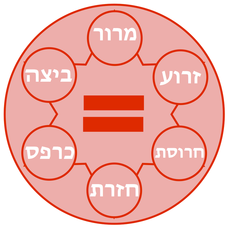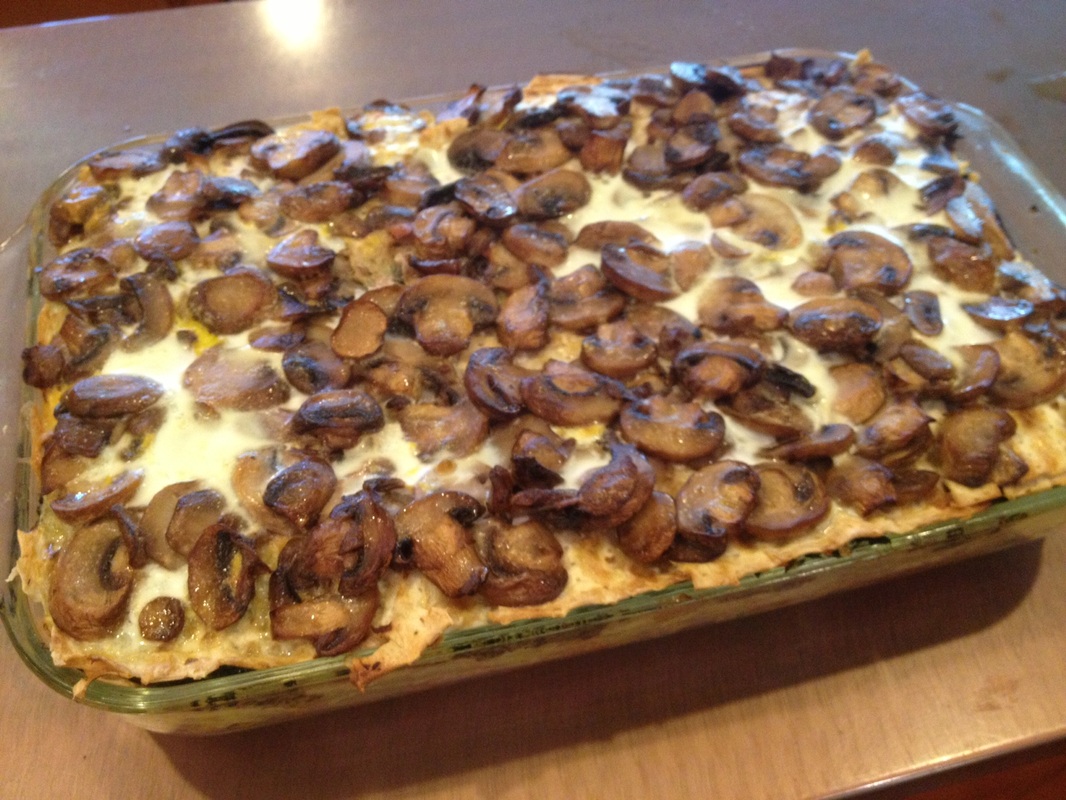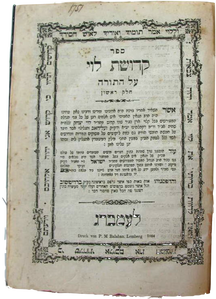|
Tonight begins the sixth day of the Counting of the Omer, the day of the divine quality of Yesod within Chesed, Foundation within Love. When our lives are built upon caring, honest, compassionate relationships with others, we are loving and feel loved. Where are the broken places in your loving relationships and how can you repair them with love?
Tonight begins the fifth day of the Counting of the Omer, the day of the divine quality of Hod within Chesed, Humility within Love. Since real love is the experience of connecting with another, and recognizing that not all value resides within ourselves, it is necessarily an experience of unselfish giving. How does humility strengthen your love?
Tonight begins the fourth day of the Counting of the Omer, the day of the divine quality of Netzach within Chesed, Endurance within Love. We ask ourselves today, what allows me to keep my compassion strong over time? How do I dispel the gradual hardening of the heart? How do we make love stay?
Tonight begins the third day of the Counting of the Omer, the day of the divine quality of Tiferet within Chesed, Balance within Love. It is a day to ask ourselves how does our love shine more brightly by being in balance? How can we deepen our love by bringing balance into our lives?
Tonight begins the second day of the Counting of the Omer, the day of the divine quality of Gevurah within Chesed, Discipline within Love. It is a day to consider how we show restraint in loving relationships, how we show "tough love."
I've written before about what the Bible has to say about the institution of marriage ("Searching for How the Bible Defines Marriage") and what Judaism teaches us about the idea of equality in marriage ("What Does the Bible Say about Marriage? What Should We Say?"). The Supreme Court, however, should not decide the constitutionality of DOMA based on the Bible or on Jewish tradition. It should decide on the Constitution, on the law, and on the precedent of its previous decisions.
To my limited understanding, DOMA is unconstitutional as it serves no compelling public interest apart from depriving some people of a basic civil right. The Court has ruled innumerable times that government cannot deny benefits or place burdens on a group of people unless there is a compelling or overriding government objective. Gay and lesbian Americans cannot be deprived of the benefits of civil marriage for the same reason that Black Americans cannot be denied the right to vote and Jewish Americans cannot be deprived of the right to hold public office. Yet, any student of the Constitution and the Supreme Court will tell you that decisions are not made entirely within the bubble of the legal system. There always is some reflection on the realities of society and the real experiences of being a human being that goes into deciding important cases. That is where the "coincidence" of this date on the Jewish calendar comes into the story. Last night, as the second day of Passover began, Jews began the Counting of the Omer. This is the period in which we count the days and weeks from this holiday to the next holiday, Shavuot. There are exactly fifty days from the holiday on which we celebrate our freedom to the holiday on which we celebrate the giving of the Torah. The Jewish mystical tradition gives a separate meaning to each of the 49 days of counting before Shavuot begins. In this week, the first week of the Omer, the focus is on the divine quality of chesed, understood as love or lovingkindness. The first day of each week also has the focus of chesed. So, this day has the double intention of the divine quality of "love within love." We contemplate today how well we bring loving compassion into our loving relationships. We meditate on how we honor love in our lives and show our caring attention to love. This is the way I hope the Supreme Court will bring the human dimension into its deliberations. We cannot truly be a loving society, a society that honors love, if we also are a society that denies the real experience of love to many of our citizens. We cannot claim to be a society that cares about matters of the heart, if we are cold-hearted with regard to our gay and lesbian brothers and sisters. By the end of the day today, the Supreme Court will have heard the logical and legal arguments for and against DOMA. Let us hope that the justices also hear the call of their hearts to heed love and allow it to enter into their judgment. Other Posts on This Topic: The Joyful Imperative to Interpret ObamaCare is Constitutional. Is It Talmudic? Tonight begins the first day of the Counting of the Omer, the day of the divine quality of Chesed within Chesed, Love within Love. We consider how much compassion we bring into our loving relationships and how we can strive to love one another more fully.
Within our food-obsessed tradition, Passover is, by far, our most food-centric holiday. Passover is almost defined by its elaborate rules for what one is required to eat and what one is forbidden from eating. Almost every Jew has some strongly held opinions about Passover dietary rules—how much observance is enough and how much is too much.
Do you follow the tradition of removing all the chametz (leavened grain products) from your home for the duration of the holiday? Do you perform the ritual of symbolically selling your chametz to a non-Jew? Do you prohibit kitniyot (rice, corn, beans, peas and lentils) during the holiday? Do you insist on using hand-made shmurah matzah on your seder table or do you settle for the square-shaped, machine-made variety? Do you forgo tap water during Passover and drink only bottled water bearing a symbol attesting it to be "Kosher for Passover"? Chances are, you think that at least some people who have different answers than you to these questions are either assimilationists, heretics, religious extremists, or insane. Possibly, you think they are all four. I think that is the way things are supposed to be. Passover is a holiday that—at its core—is supposed to get us to think deeply about what we eat and even what foods we allow into our homes. Regardless of your particular practice, if you are engaged in any practice that gets you to make choices about your food, you are engaged in a festival that celebrates both the freedom to choose and the obligations that accompany all freedoms. Have a wonderful, joyful Passover. May the foods we eat, and the choices we make about the foods we don't eat, be a blessing to us all. Other Posts on This Topic: Matzah and Chameitz One Seder or Two?
This early master of Chasidism said that when the verse refers to a person who "does one of them," it really means a person who observes a mitzvah, not one who violates it. He observed that: When you commit a transgression and you know it, you feel your heart break inside you and you return to God in repentance. However, when you do a mitzvah and you glorify yourself in it, you think highly of yourself and fill yourself with pride over it. You say to yourself, "I have added to the riches of the Holy Blessed One." That, says Levi Yitzchak, is a much more dangerous place to be than just committing a sin. A person who turns the performance of a mitzvah into an opportunity to get a swelled head of self-righteous glory is much less likely to even recognize that such behavior, truly, is sinful. It would have been better that he or she had never done the mitzvah at all than do it in a prideful way. Levi Yitzchak states boldly that such behavior is "no mitzvah at all." He says. "Rather, it is a transgression. It is called a sin."
Attitude counts. From the perspective of Jewish tradition, attitude can matter more than the actual deed. A mitzvah, after all, is a commandment — something that we have been asked to do by God. If we turn it, instead, into a cause for celebrating ourselves, we're not really listening to God. We're only listening to our own egos. Does that mean that a person should not feel good about writing a check to help the needy? Does it cancel out the good you have done if you take pleasure in studying Torah? Of course not. The mitzvot are intended to bring joy into our lives, but it is the joy of joining ourselves to God, not of inflating our opinion of ourselves. This is the difference between the emptiness of self-serving joy, and the fullness of joy that connects us to others. It is a distinction that is subtle, but real. It is the difference between the person who makes a large donation to the synagogue and angrily insists upon the plaque dedicated to his or her honor, versus the person who gives merely for the pleasure of helping his or her community. So, the next time you do something wonderful, make sure you know for Whom you are doing it. Get the full joy out of your mitzvah by doing for the sake of giving back to your Source, not for the sake of feeding your ego. Other Posts on This Topic: Vayikra: The Joy of Contrition Bamidbar: A Song of Humility |
WelcomeThis blog is about living a joyful Jewish life and bringing joy to synagogues and the Jewish community. Join the conversation by commenting on posts and sharing your experiences. For more on the topic, read the First Post.
Recent PostsPurim & COVID-19
The Honor of Heaven Chasing Our Own Tails Drilling Under Your Seat Change the World Self-Righteousness Where We Came From What We Must Believe Is Passover 7 or 8 Days?Origin Story Va'eira: Leadership Jeff's Favorites• First Post
• Searching for How the Bible Defines Marriage • The Difference between God and Religion • In the Beginning of What? • Rape, Abortion and Judaism • Ten Thoughts about Being a Rabbi • Temple Dues and Don'ts • A Pesach Lesson from Yoga • The Purpose of the Torah Torah PortionsGenesis
Bereshit Noach Lech Lecha Vayera Chayei Sarah Toledot Vayetze Vayishlach Vayeshev Miketz Vayigash Vayechi Exodus Shemot Va'eira Bo Beshalach Yitro Mishpatim Terumah Tetzaveh Ki Tisa Vayakhel Pekudei Leviticus Vayikra Tzav Shemini Tazria Metzora Acharei Mot Kedoshim Emor Behar Bechukotai Numbers Bamidbar Naso Beha'alotecha Shelach Korach Chukat Balak Pinchas Matot Masei Deuteronomy Devarim Va'etchanan Ekev Re'eh Shoftim Ki Tetze Ki Tavo Nitzavim Vayelech Ha'azinu Vezot Haberachah Holidays Shabbat Rosh Chodesh Pesach/Passover Omer Period Yom HaShoah Yom HaZikaron Yom Ha'atzma'ut Pesach Sheini Lag B'Omer Yom Yerushalayim Shavuot Fast of Tammuz Tisha B'Av Tu B'Av Rosh Hashanah Days of Awe Yom Kippur Sukkot Hoshanah Rabbah Shmini Atzeret/ Simchat Torah Chanukah Tu BiShvat Adar (Joy Increases!) Purim Archives
October 2023
Loading
|

|
|



 RSS Feed
RSS Feed
